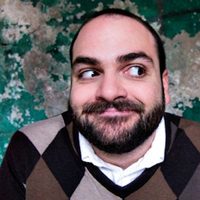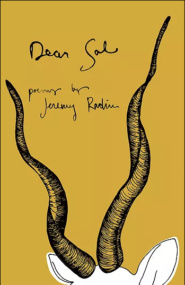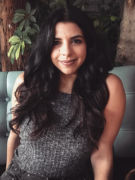Litdish: Jeremy Radin, Poet
Welcome to our new Amuse-Bouche occasional series, Litdish. This is a solicited series of interviews with writers and artists in conversation with our staff about literature, art, social justice, and community activism. Please enjoy. ~The Editors

Jeremy Radin
Jeremy Radin is a poet, actor, and teacher living in Los Angeles. He’s appeared on several television shows including It’s Always Sunny in Philadelphia, CSI, ER, and Zoey 101, in films such as Terrence Malick’s The New World and Wrestlemaniac, and in many plays. His poems have been published in Cosmonauts Avenue, Nailed, Sundog Lit, Union Station, Winter Tangerine, and elsewhere. He teaches acting at The Beverly Hills Playhouse and is the current coach of the Get Lit Players. He is the author of two collections of poetry, Slow Dance with Sasquatch (Write Bloody Publishing, 2012) and Dear Sal (not a cult press, 2017). Follow him @germyradin.
Interviewed by Jessica Abughattas via email.
Jessica Abughattas: What was your original impetus for writing Dear Sal?
Jeremy Radin: Money. Haha just kidding. Dear Sal came out of the rehearsal process of the play Talley’s Folley by Lanford Wilson, which I did a few years back. The play takes place in Lebanon, Missouri during the summer of 1944. In it, Matt Friedman, a German-Jewish accountant living in St. Louis, courts Sally Talley, a Protestant nurse’s aide living in Lebanon. One year before the events of the play, the two had met in Lebanon, fallen for each other quickly, and engaged in a very brief romance, after which Matt had returned to St. Louis where he’d spent the next year writing Sally a letter a day (while also communicating with her aunt). At the end of this year he comes down to her house in Lebanon to see her and the play begins. It takes place in a boathouse. There are crickets and starlight and a river and a brass band that plays in a park across the river. There’s waltzing and ice skates and Communsim. It’s very romantic. Each of them has something buried in their past (I won’t reveal it here) that keeps them from believing that this kind of love has a place in their lives.
The more I write and read and otherwise engage with poetry, the more I believe that I ought to know less when I finish than I did when I started.
During rehearsals, my director (and longtime acting teacher and friend, Art Cohan, to whom the book is half-dedicated along with Samantha Sloyan, who played Sally) suggested to me that it might be useful for me to write “Sally” a letter a day. These letters turned into poems and over the next couple of years, the book was born. What started as a simple exercise toward establishing a richer understanding of the character ended up becoming something else—an experiment in inhabiting the strange, fluid middle-ground between actor and role (the acting teacher Milton Katselas used to say, “You are stuck with the character and the character is stuck with you”), pulling from the circumstances of the play and of my own life, trying to get at something which lives at the intersection of repressed desire, loneliness, Jewishness, terror, relentless self-mythologizing, and hope. What that thing is, I have no idea, which is the way I think it should go. The more I write and read and otherwise engage with poetry, the more I believe that I ought to know less when I finish than I did when I started.
JA: Among other things, Dear Sal explores diasporic Jewishness, a theme that occurs often in your poetry. In the current social and political climate, what does it mean to you to write about your Jewish identity?
JR: I think that’s something I’m still trying to figure out. The more I write about it, the more I learn about why I feel the need to keep writing about it.
I know that it connects to members of my family—my great-grandparents in particular—that I never got to know. It connects me to a time and place (Eastern Europe, turn of the twentieth century) that deeply fascinates and troubles me. In the past few years I’ve become interested in epigenetics, inherited trauma. The idea that the way I respond to something today, feeling or circumstance, may take root in the traumas suffered by my ancestor thousands of miles away, hundreds of years ago. One of my all-time favorite monologues is the one spoken by the rabbi at the beginning of Tony Kushner’s Angels in America. He’s eulogizing an old woman who came from Eastern Europe:
“Descendants of this immigrant woman, you do not grow up in America… You do not live in America. No such place exists. Your clay is the clay of some Litvak shtetl, your air the air of the steppes—because she carried the old world on her back across the ocean… You can never make that crossing that she made, for such Great Voyages in this world do not any more exist. But every day of your lives the miles that voyage between that place and this one you cross. Every day. You understand me? In you that journey is.”
So yeah, that’s what that is.
On the other hand, I read a really wonderful Twitter thread recently by a poet named Claire Schwartz (@23cschwartz) which makes me think about this question in a very different way than I might have a month or so ago. She explores the idea that anti-semitism (particularly against Ashkenazi Jews) and the Holocaust have been centered in conversations about oppression and historical trauma because they target/targeted people who have by now essentially assimilated into Whiteness—that the place of the Holocaust and anti-semitism at the center of those conversations is a privileged place.
 When Trump was elected and in the months since, as White Nationalist figures have become increasingly prominent in the media, as we are forced to learn their names and memorize their faces, I’ve felt, for the first time in my life, more a Jew than an American. That’s a new feeling for me. It is not a new feeling for millions of Black and Brown people in this country, many (most) of whose ancestors arrived here long before mine.
When Trump was elected and in the months since, as White Nationalist figures have become increasingly prominent in the media, as we are forced to learn their names and memorize their faces, I’ve felt, for the first time in my life, more a Jew than an American. That’s a new feeling for me. It is not a new feeling for millions of Black and Brown people in this country, many (most) of whose ancestors arrived here long before mine.
I wonder if in writing about my Jewish identity, I’m not only building a bridge between me and my ancestral and cultural history, but to the people who are right now, right here, suffering the things that my ancestors suffered long ago, back over there, about which I am free to write from a position of relative safety, certainly of great privilege. I wonder if I write to reaffirm my responsibility in fighting for those people, in listening to them, in centering their trauma in a conversation that has historically centered mine.
JA: The aftermath of Trump’s election has people turning to poetry for both solace and protest. Are there any poets that have been particularly resonant for you during this time?
JR: Yes! I love this question. I think the most vital poetry being written right now is being written by writers of color, particularly women and LGBTQIA writers. Some writers I think should be read everywhere all the time forever amen are, in no particular order:
Aracelis Girmay, Aziza Barnes, Morgan Parker, Angel Nafis, Franny Choi, Ocean Vuong, Phillip B. Williams, Layli Long Soldier, Ross Gay, Jessica Abughattas, Solmaz Sharif, Hieu Minh Nguyen, Fatimah Asghar, Donnika Kelly, Ada Limón, Kaveh Akbar, Saeed Jones, Tommy Pico, Monica Youn, Safia Elhillo, Natalie Diaz, Li-Young Lee, Joshua Bennett, Patrick Rosal, Chen Chen, Danez Smith, Tiana Clark, Safiya Sinclair, Anis Mojgani, Nate Marshall, and many others.
As well, to refer back to the above question, a couple writers doing tremendous work are sam sax and Shira Erlichman.
JA: Which non-writing-related aspect of your life most influences your writing?
JR: Acting, which I’ve been doing for twenty years. Everything comes back to that for me. It’s my first love. I’ve been told recently that many of my best poems are essentially monologues. When I write poems I can often hear them being spoken (often in a weird Russian accent???) and that certainly affects the shape of the poem—the form, the syntax, where the line breaks, etc. Though I believe it can sometimes hinder me as well, as so much of acting relies on an emotional “tracking”—how do I get from one moment to the next, that I feel like poetry doesn’t always rely on. Or at least in poetry it can be a lot more subterranean. I think I’ll be learning for the rest of my life how the acting shapes the poetry and vice versa. Sometimes I feel like they’re best friends and sometimes I feel like they hate each other, but hey, siblings, am I right?
JA: How has your writing or writing process changed since you started out?
JR: The best way for me to answer this is to describe how my reading process has changed. The writing/writing process has changed I think completely as a response to that—the poems have gotten tighter, more interested in craft, form, communication, the world—I think in the way that all writing changes if you stay with it long enough. Mary Ruefle describes it better than I can in her tremendous book of lectures Madness, Rack, and Honey:
“I used to think I wrote because there was something I wanted to say. Then I thought, “I will continue to write because I have not yet said what I wanted to say”; but I know now I continue to write because I have not yet heard what I have been listening to.”
If you can identify good work, you can struggle toward it. If it’s hard and makes you want to quit every day, that means it’s working.
I believe every writer goes through a version of this, but I also believe that, like every journey, there are steps forward and steps back. A journey is a sloppy thing. A journey toward a process and toward describing that process is a sloppy thing. What holds true today may feel trite or dishonest tomorrow. What does stay fairly consistent is the reading. Years ago the poet Jon Sands was in LA and I was driving with him to a reading. He asked what I was reading. I said I didn’t really have time to read. He said something more or less to the effect of, “MAKE TIME MOTHERFUCKER, IT’S YOUR JOB.” He told me that he usually had a book of fiction, a book of non-fiction, and a book of poems going. So that’s what I set out to do. It took a long time to get the machine working, but it’s become the steadiest part of my process. I’ve also added a play to the list.
Since I’ve started reading like that, my work has changed monumentally. It is a deeply unmagical magic. You want to get good at acting? Watch good actors. Want to get good at writing? Read good writers. If you can identify good work, you can struggle toward it. If it’s hard and makes you want to quit every day, that means it’s working.
JA: What is the best writing advice you’ve ever received? The worst?
JR: The poet Mindy Nettifee said to me when I was first starting out, “Find the ones that make you want to quit. Try to copy them. In failing at copying all these different voices, you will arrive at your voice.” When I started I wanted to be Bob Dylan. Then Leonard Cohen. Then I discovered Mindy’s work and Derrick Brown’s and Anis Mojgani’s and Buddy Wakefield’s and so many others. I’ve failed at becoming all of them and accidentally became me. I think.
Another good bonus piece of advice was something Saeed Jones said, I believe in an interview: for every poem you write, read five.
The worst is probably “write every day.” The only things I do every day are breathe, eat, sleep, drink water, and worry about why I’m not writing every day.
JA: Three social media dos or don’ts for an emerging writer?
JR: This is a tough one. I feel like this is so dependent on so many things. Most emerging writers are younger and better at social media than me. Also I think a lot of this depends on race/gender/etc. Here might be a good place for me to address primarily straight male writers, cause that’s what I am.
DO use social media as a place to listen. Here is where we have unfettered access to the chronicled lived experience of folks who are different than us, whose lives we’ve maybe not yet tried to imagine. We can peruse at our leisure, in a quiet place. We can feel the blissful freedom not to respond or plug our voices in to spaces where they don’t need to be, to learn what is our lane and what isn’t. We may fail at this. In so many ways, it’s about failing. If we learn to fail gracefully here we may learn to fail gracefully in our work. Be wrong, listen, learn.
DON’T let the speed of social media dictate the speed of your work. Just because lots of people you know are winning awards and publishing in big journals and sharing about it all the time doesn’t mean you need to rush your work into the world. If you are patient and steadfast and willing, your time will come. Or, guess what, it might not, but it certainly won’t if you’re writing to win a race that doesn’t exist against other writers whose processes (and the length and difficulty of those processes) are invisible to you.
Celebration is the antidote to envy.
DO use your platform to celebrate work that moves you. This is a great way of combating feelings of inadequacy that come from maybe watching everyone around you succeed when you feel you aren’t succeeding. It exercises the muscle of celebration, of joy, which poetry craves. It becomes about maintaining a sense of wonder that I think the envy (according to Kaveh Akbar, “…the only deadly sin that’s no fun for the sinner”) generated by social media can often work toward stripping us of. Celebration is the antidote to envy.
Using your platform as a way to center voices different from yours is great too. This especially for fellow straight male poets. Share the work of writers/artists with different lived experiences—writers/artists of color, women, queer writers/artists, etc. Share the work without commentary. Many wonderful dialogues can begin this way.
BONUS you get three hashtags.
JA: What are you currently reading?
JR: Fiction: Kindred by Octavia Butler
Nonfiction: Men We Reaped by Jesmyn Ward
Poetry: Calling a Wolf a Wolf by Kaveh Akbar
Play: The Jew of Malta by Christopher Marlowe
JA: What’s your favorite nut butter and why?
JR: What are you trying to do, start a war? Do I really have to say in front of all these people that cashew butter once and for all is the superior nut butter due to decreased stickiness and an increased natural sweetness that, when combined with a sprinkle of sea salt, blossoms in the mouth like a complicated sex orchard? And do I need to then say to myself wait Jeremy—you’ve just bought your second jar of MaraNatha no-stir lightly sweetened peanut butter and you’ve been quietly questioning all you thought you knew? I don’t know the answer. Is there an answer? When I was in kindergarten it was Jif all the way no questions asked until I did a blind taste test and Skippy emerged victorious. My world was rocked that day as it was rocked the first time I tried cashew butter and then again the first time I tried MaraNatha peanut butter. Also does Nutella count as a nut butter? Also have you ever tried pouring a little maple syrup into your Laura Scudders before you stir the oil in? Let’s live together in the mystery. I commit to a life of being bewildered by the various deliciousness of nut butters and to the joyous fluidity of that bewilderment. Thank you for your time.

 Jessica Abughattas has poems published in Thrush Poetry Journal, Stirring Lit, Heavy Feather Review, and elsewhere. She is an MFA candidate at Antioch University, associate managing editor of Lunch Ticket, and a reader for Frontier Poetry. Follow her on Twitter: @jessicamelia22
Jessica Abughattas has poems published in Thrush Poetry Journal, Stirring Lit, Heavy Feather Review, and elsewhere. She is an MFA candidate at Antioch University, associate managing editor of Lunch Ticket, and a reader for Frontier Poetry. Follow her on Twitter: @jessicamelia22


